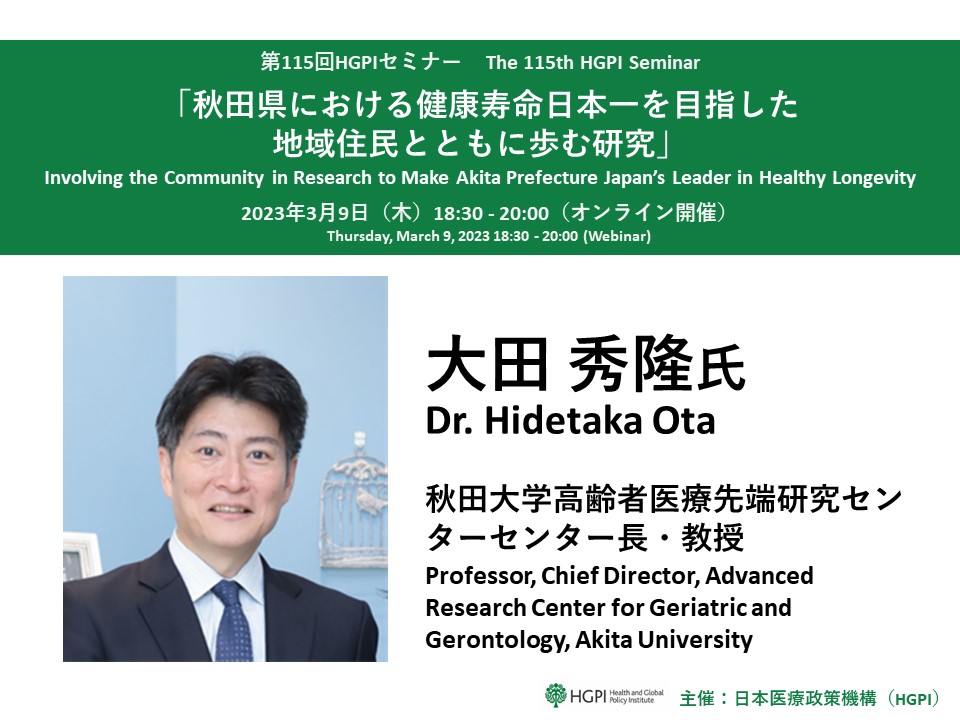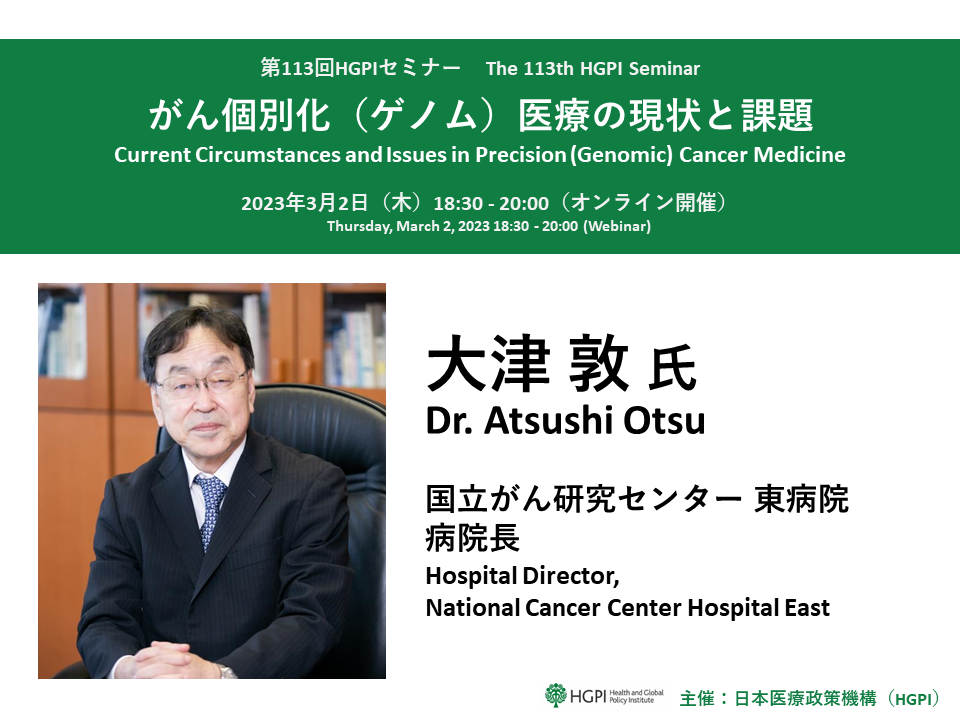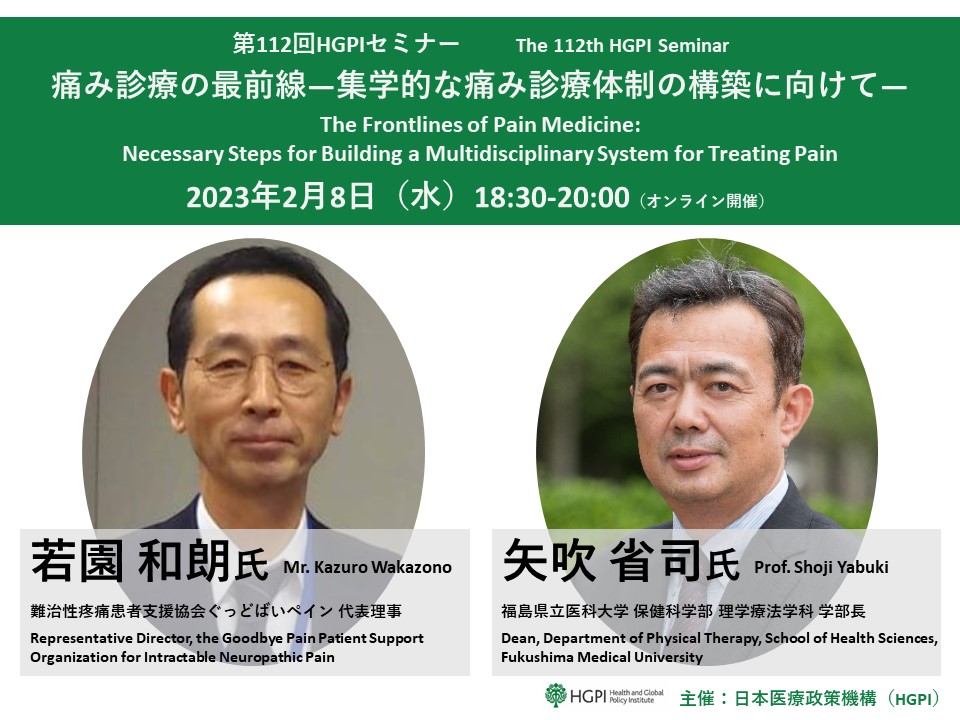[Event Report] The 114th HGPI Seminar – Socioeconomic Factors and Women’s Health: Measures Needed to Achieve Women’s Health and Advancement (March 6, 2023)
date : 4/26/2023
Tags: HGPI Seminar, Women's Health
![[Event Report] The 114th HGPI Seminar – Socioeconomic Factors and Women’s Health: Measures Needed to Achieve Women’s Health and Advancement (March 6, 2023)](https://hgpi.org/en/wp-content/uploads/sites/2/hs114-topr_JPNENG-1.png)
For the 114th HGPI Seminar, we hosted Dr. Miho Iida from the Department of Preventive Medicine and Public Health at the Keio University School of Medicine. Dr. Iida gave a comprehensive overview of socioeconomic factors and women’s health that included an introduction to the “Survey on Socioeconomic Factors and Women’s Health,” which was conducted by HGPI, as well as necessary measures to promote women’s health and enable them to play active roles in society.
<POINTS>
- Since 1994, the World Health Organization (WHO) has recognized all gender-based forms of inequality and discrimination among women and men as well as health disparities among women as issues that must be addressed, yet those issues remain unresolved.
- Menstrual and menopausal symptoms result in productivity losses of approximately 362.8 billion yen per year.
- To address women-specific health concerns, society must enhance health literacy among women, increase awareness and understanding among those around them, and establish systems and environments that cater to women’s health needs.
The Current Situation and Issues on Women’s Health
- Since 1994, the WHO has recognized all gender-based forms of inequality and discrimination among women and men as well as health disparities among women as issues that must be addressed, yet those issues remain unresolved
A report published by the WHO in 1994 described how women are often segregated in all aspects of life due to biological and physiological differences, and how it is unjust for these differences to be used to promote discrimination and injustice. That report also pointed out that while women’s health status has been improving overall, it will be crucial we address the health disparities that exist between those who have access to medical and other services, live in environments with fewer health risks, and have the ability to make self-determined choices, and those who do not.
- Menstrual and menopausal symptoms result in productivity losses of approximately 362.8 billion yen per year
As a result of changes in lifestyles, the number of menstrual periods each woman experiences over the life course has increased compared to the past, and women of menstruating age are becoming increasingly active in society. In the “Survey on Socioeconomic Factors and Women’s Health,” which was conducted by HGPI in 2022, around 80% of women reported that menstrual and menopausal symptoms affect their daily lives and work productivity. Additionally, approximately 7.2% to 9.4% of working women said they had been absent, tardy, or left work early due to those symptoms in the past three months. We can estimate that the total cost of productivity lost to these symptoms for all working women in Japan is approximately 362.8 billion yen per year.
- There are few opportunities for people to learn about women’s health
Also, in the aforementioned HGPI survey, 36.1% of women and 55.6% of men reported that they did not have opportunities to learn about women’s health during school education or through other means, which suggests that educational opportunities are insufficient. When asked about workplace training, across all company sizes, only about 10% of respondents reported having somewhat more opportunities to learn about women’s health. These respondents were mostly in management positions and the overall number of learning opportunities was inadequate. Respondents reported having more training opportunities in the workplace were also more likely to say their workplace has a good understanding of women’s health.
Initiatives that society can take to address women-specific health concerns
- Improve women’s health literacy and further promote sexual and reproductive health and rights (SRHR)
People lack opportunities to acquire accurate knowledge about menstrual problems and how to address them, which may have an impact on health-seeking behaviors among women. Parental perceptions of menstrual problems can also influence individual behavior in seeking medical care, with patients discouraged from seeking care if their parents perceived menstrual pain as something to be endured. To address this issue, it is necessary to improve health literacy through school education and provide educational opportunities for parents to refresh their knowledge on women’s health.
Sexual and reproductive health and rights (SRHR) are important not only for supporting self-determination regarding pregnancy and childbirth and providing safe medical care, but also for promoting the health and well-being of all people and families. It is essential to promote SRHR so that everyone can make informed decisions about their sexual and reproductive health and have access to the information and tools they need to do so.
- Raise awareness and understanding among surrounding people and develop workplace climates that foster awareness and understanding that span entire companies
Workplaces that promote good communication and psychological safety can enhance women’s self-actualization. In the U.K., guidance on workplace management regarding women’s menopausal symptoms has been developed that emphasizes the importance of improving awareness and understanding among colleagues, creating safe spaces for open discussions, and fostering empathy, support, mutual help, and dialogue. In Japan, several examples of efforts to create open workplace climates have been reported, and these efforts should be expanded to promote workplace health and well-being for women.
- Develop systems and environments that address women-specific health concerns
Creating a system for early detection of menstruation-related problems
The items included in routine health checkups conducted at workplaces are insufficient for supporting women’s health. To address this issue, it will be necessary to consider the addition of items such as a questionnaire on menstrual symptoms, as well as items related to anemia, such as iron and ferritin levels. Moreover, it is important to promote efforts to address women’s health issues through other occupational health activities in general. These include workplace stress check systems and providing interviews with occupational physicians and nurses. By doing so, workplaces can adopt more comprehensive and inclusive approaches to employee health and well-being that are specifically tailored to the needs of women.
Providing environmental and financial support to address menstruation-related problems
Common menstrual problems such as dysmenorrhea, premenstrual syndrome, and menopause can be effectively treated with medical intervention. Low dose estrogen progestin (LEP) and hormone replacement therapy (HRT) have been proven to help relieve various symptoms as well as reduce multiple health risks. However, these treatments are not widely utilized in Japan.
While more efforts to address women’s health issues in the workplace are being made in recent years, many challenges linger. Workplace support, primarily from occupational physicians, would be beneficial, but the Industrial Health and Safety Act did not anticipate this issue, and current laws and regulations do not specify how to address women’s health issues. While satisfaction with forms of support provided in workplaces is not always high, there are examples of improved work performance at companies that introduced online medical support. Such support includes referrals to partner companies and financial assistance for issues related to menstruation and other health concerns.
Promoting efforts by primary care and family obstetricians and gynecologists (OB-GYNs) specializing in women’s health
There are certification systems available for physicians specializing in women’s health who provide women with support throughout the life course, from adolescence to old age. These specialists include Women’s Health Care Specialists certified by the Japan Society for Menopause and Women’s Health and the Japan Women Foundation’s Femship Doctor initiative. However, some general occupational physicians and OB-GYNs may not have sufficient knowledge to help patients maintain and improve quality of life (QOL) from a prevention perspective. Therefore, it is crucial to expand these efforts to create a society where women can easily maintain their health throughout the life course.
- Eliminate unconscious biases and preconceptions
Some argue that despite the implementation of various systems and mechanisms to promote women’s activities, they do not always achieve the desired results because they fail to address unconscious biases. For example, a survey conducted by the Gender Equality Bureau Cabinet Office found that about 35% of both men and women believed that “women tend to be emotional.” However, it is possible that this perception stems from medically explainable conditions such as premenstrual syndrome or psychological symptoms resulting from menopausal disorders. Despite the availability of medical treatments for these symptoms, the assumption that “women are prone to emotional problems” has hindered women from seeking consultations and treatment. Eliminating preconceptions and unconscious biases among all people could promote women’s health and workplace success and ultimately lead to the creation of an inclusive society where everyone can live in comfort.
[Event Overview]
- Speaker: Prof. Miho Iida (Assistant Professor, Department of Preventive Medicine and Public Health, School of Medicine, Keio University)
- Date & Time: Monday, March 6, 2023; 19:00 – 20:30 JST
- Format: Online (Zoom webinar)
- Language: Japanese
- Participation fee: Free
- Capacity: 500
■ Speaker Profile:
 Miho Iida (Assistant Professor, Department of Preventive Medicine and Public Health, School of Medicine, Keio University)
Miho Iida (Assistant Professor, Department of Preventive Medicine and Public Health, School of Medicine, Keio University)
Professor Miho Iida is a graduate of the Keio University School of Medicine. After completing her residency at Kameda Medical Center, she joined the Department of Obstetrics and Gynecology at the Keio University School of Medicine. While practicing medicine in the field of obstetrics and gynecology at the university hospital and at a city hospital, she enrolled in the doctoral course at the Keio University Graduate School of Medicine to study viewpoints on public health. She currently serves as an Assistant Professor at Keio University’s Department of Preventive Medicine and Public Health. In that role, Professor Iida is engaged in various efforts for better women’s health from the perspectives of both a specialist in obstetrics and gynecology and in social medicine. These activities include conducting epidemiological research, teaching students, serving as an OB-GYN, and providing women’s health support in workplaces. Her roles include obstetrician and gynecologist, medical specialist in women’s health care, specialist and instructor in social medicine, and sponsor of the Japan Society for Occupational Health Working Women Health Study Group.
日本語
Top Research & Recommendations Posts
- [Report and Recommendations] Discussion Points in Healthcare DX Project Expert Panel Meeting (April 2, 2024)
- [Event Report] Planetary Health Expert Meeting Aiming for Sustainable Healthcare: Learning from the Impact of Environmental Pollution and Medical Waste During the Pandemic (February 16, 2024)
- [Announcement] A Significant Step Towards the Building a Green Healthcare System: Support for the Formal Expression of Interest by the Japanese Government Delegation to the ATACH at the Executive Board Meeting of the WHO (February 16, 2024)
- [Policy Recommendations] Kidney Disease Control Promotion Project 2023 “Establishing Kidney Disease Control Measures with Patient, Citizen, and Community Engagement and Collaboration” Policy Recommendations, a Collection of Good Practices of Chronic Kidney Disease (CKD) and Control Measures in Local Governments (February 14, 2024)
- [Research Report] Building a Mental Health Program for Children and Measuring its Effectiveness (June 16, 2022)
- [Research Report] 2019 Survey on Healthcare in Japan
- [Research Report] Survey of Japanese Physicians Regarding Climate Change and Health (December 3, 2023)
- [Announcement] HGPI Joins Global Climate and Health Alliance (March 23, 2024)
- [Policy Recommendations] Dementia Prevention Initiatives for Achieving a Dementia-Friendly and Inclusive Society (March 26, 2024)
- [Policy Recommendations] Three Necessary Perspectives for Formulating the Basic Plan for the Promotion of Policies on Dementia: Creating a Society That is Inclusive for All People at All Times (April 1, 2024)
Featured Posts
-
2024-04-12
[Announcement] HGPI Joins Global Climate and Health Alliance (March 23, 2024)
![[Announcement] HGPI Joins Global Climate and Health Alliance (March 23, 2024)](https://hgpi.org/en/wp-content/uploads/sites/2/ph-20240323-top.png)
-
2024-04-16
[Activity Report] HGPI Child Health Project Selected to Implement FY2024 Nippon Foundation Grant Program, “Establishing a Skill Development Program and Collaborative Network for Improving Mental Health for Students with Intellectual Disabilities” (April 15, 2024)
![[Activity Report] HGPI Child Health Project Selected to Implement FY2024 Nippon Foundation Grant Program, “Establishing a Skill Development Program and Collaborative Network for Improving Mental Health for Students with Intellectual Disabilities” (April 15, 2024)](https://hgpi.org/en/wp-content/uploads/sites/2/child-health-project.png)
-
2024-04-18
[Event Report] NCDs-related Cross-project Meeting: The 2nd Meeting on Non-Communicable Disease in Hokkaido and Tohoku (March 15, 2024)
![[Event Report] NCDs-related Cross-project Meeting: The 2nd Meeting on Non-Communicable Disease in Hokkaido and Tohoku (March 15, 2024)](https://hgpi.org/en/wp-content/uploads/sites/2/ncd-ckd-ob-cvd-20240315-top.jpg)
-
2024-04-23
[Registration Open] The 125th HGPI Seminar: Progress and Prospects for Domestic Measures on Health Problems Caused by Alcohol (May 24 , 2024)
![[Registration Open] The 125th HGPI Seminar: Progress and Prospects for Domestic Measures on Health Problems Caused by Alcohol (May 24 , 2024)](https://hgpi.org/en/wp-content/uploads/sites/2/HGPI_20240524_125thHGPIseminar_Eyecatch_rev.jpg)







